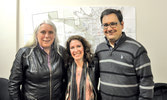Québec solidaire visits West Québec:
More funds for health, education, rural development

To demonstrate that Québec solidaire is not a Montreal-centric party and that its influence is growing across Quebec, Québec solidaire (QS) embarked on a provincial tour, visiting West Quebec in early May.
“Following our 2014 electoral record, we noticed two things. First, QS is no longer just a Montreal political party. We broke into a few regions, including here. We feel there’s a population base ready to support us even if the current electoral system does not favour smaller parties,” said Andrés Fontecilla, QS president.
In that election, the surprise was QS’s third place in the Hull riding. Benoit Renaud finished ahead of CAQ with 11.06% of the vote. In 2012, Bill Clennett from QS had finished fourth with 7.94%.
“We are fine-tuning our economic platform and we want people’s input, their perspective on regional economic development,” said Manon Massé, QS MNA for the Montreal riding of Sainte-Marie–Saint-Jacques.
The tour included focus groups on culture and on agriculture. Outaouais is the seventh region visited by the three-MNA party. The tour’s mandate is to develop an economic action plan for each region.
“We know wall-to-wall policies have their limit. Provincial programs must be adapted for each region,” said Fontecilla.
Health-care and education
During their three-day visit, the QS team saw the critical needs in this region.
According to Charmain Levy, QS Outaouais spokesperson, many of Outaouais’ shortfalls in education and health care are due to the Liberals’ austerity ideology.
“They believe we don’t need certain services here, such as post-secondary institutions or health-care, because we can cross the river. We at QS strongly disagree,” she said. “We should have services in our province for our residents.”
Money from resource royalties
The Liberals’ claim that there’s no money to fund all services does not fly with Levy, who said that there are many profitable businesses that pay less taxes than many residents. “It’s the State that does not want to get that money to invest in education – that’s nonsense,” Levy said.
“We see the current government is allowing the public system to implode to facilitate the system’s privatization. The super-clinic is a perfect example. With these super-clinics, the Minister of Health (Gaétan Barrette) is attempting to create a parallel system to CLSCs. Why not support what’s already there?” said Massé, elected to the National Assembly for the first time in 2014.
“Yes, we are now re-creating CLSCs under the control of a business owner. Physicians are no longer physicians, they are business people,” noted Fontecilla. “We pay them a fortune and yet they register as a business to save on taxes. Public resources destined towards physicians are growing in front of our very eyes -- while they are contributing to privatizing the health-care system.”


